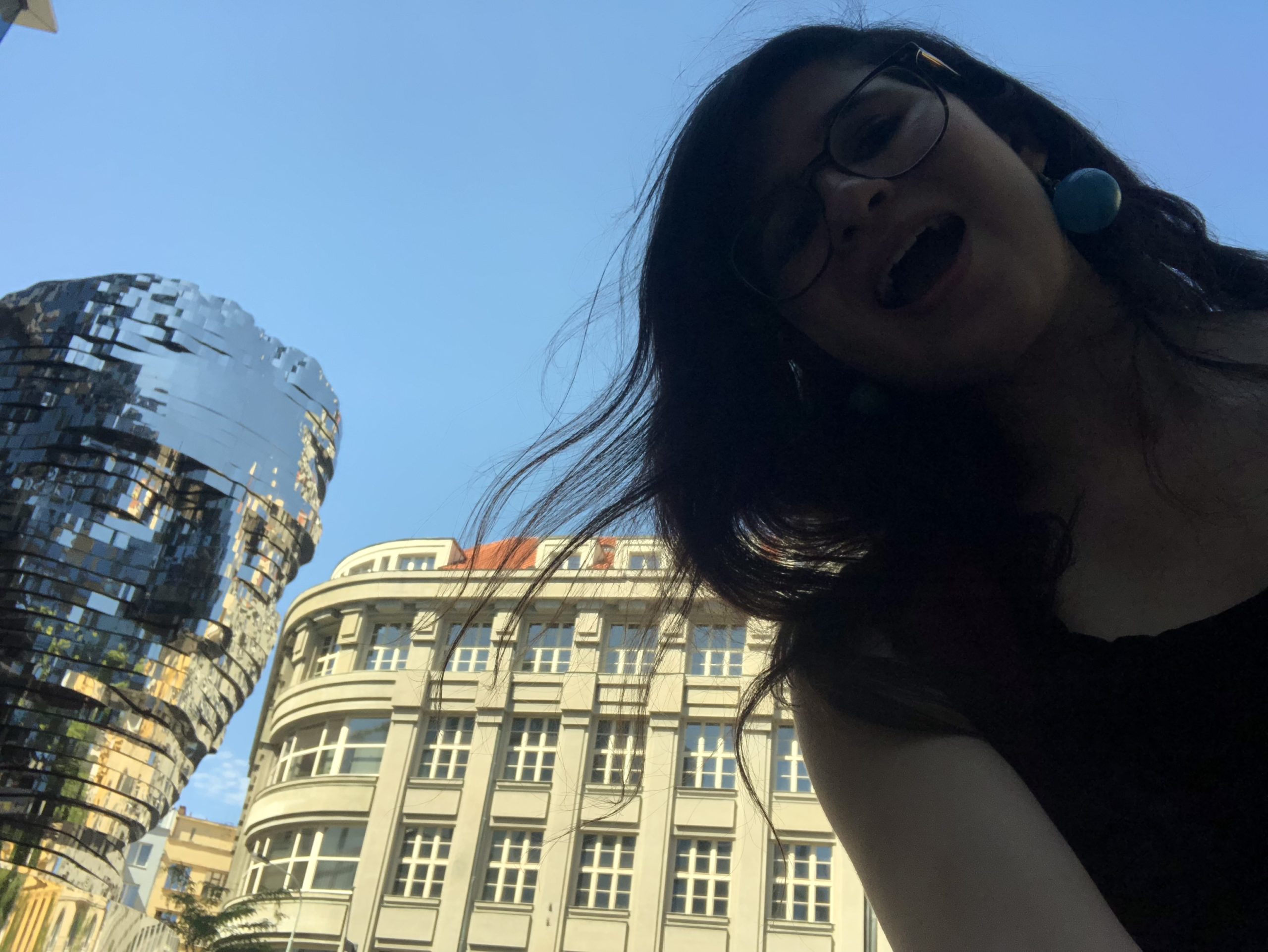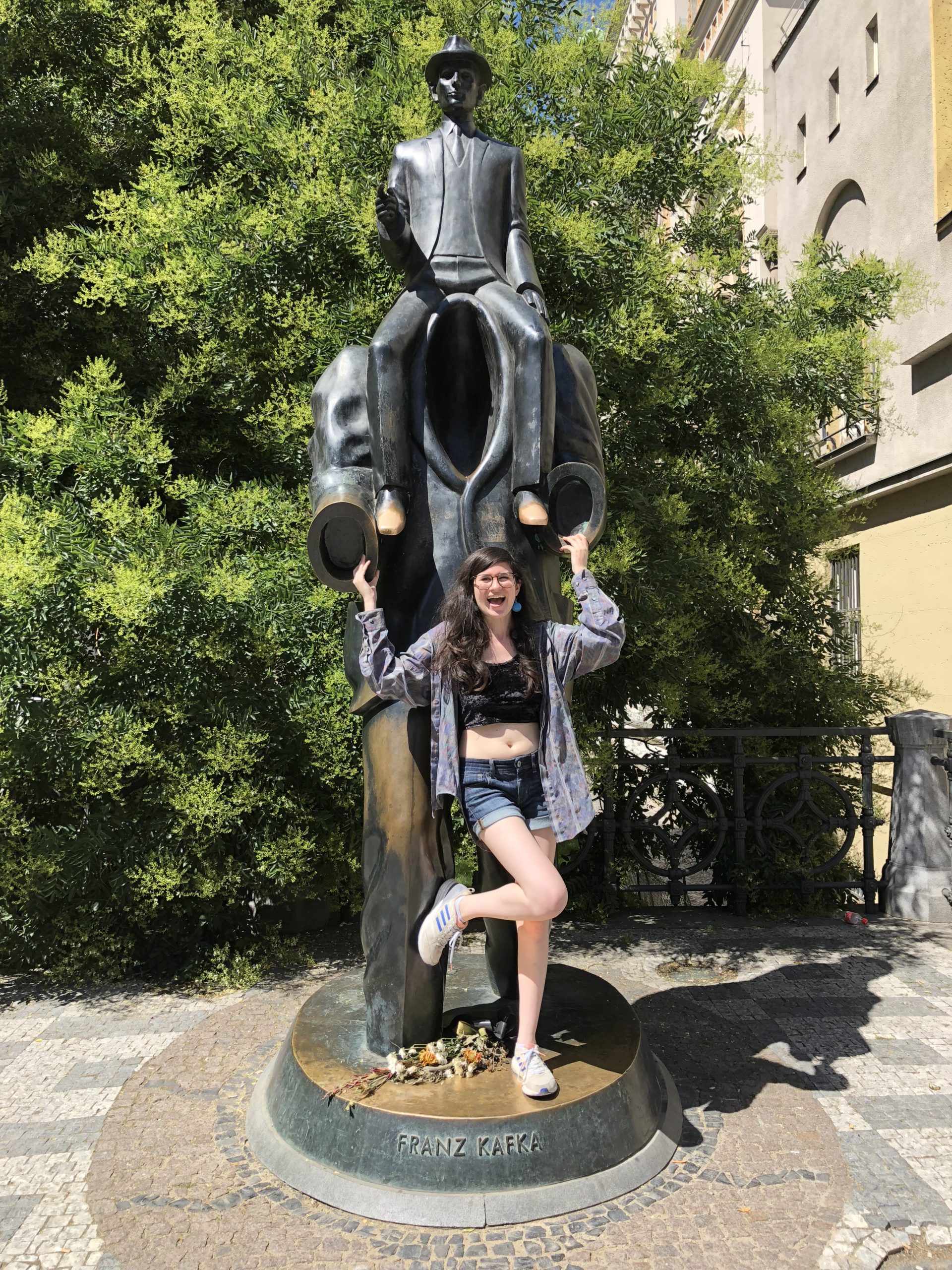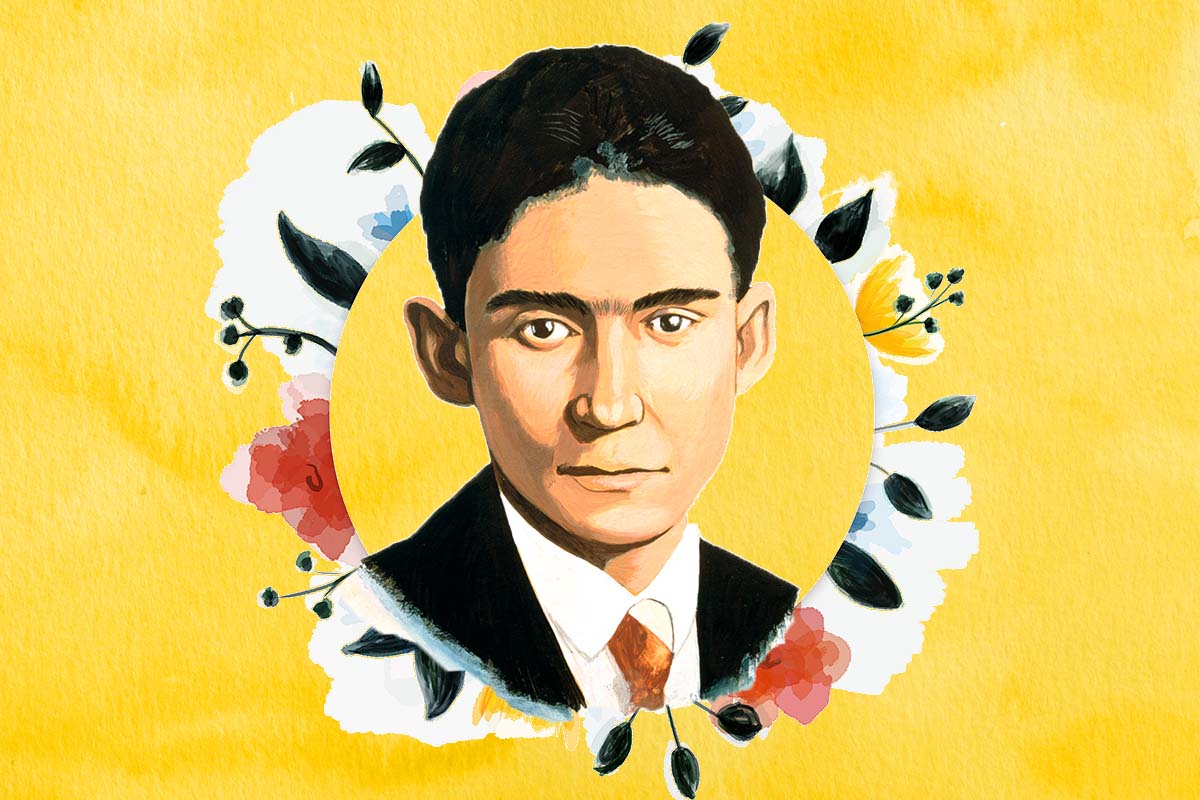It was Halloween my freshman year of college when I, entirely sober and dressed as Sharknado 5, saw a sign that boasted the phrase, “Learn German if you Der,” which literally means “Learn German if you The.” I laughed for 15 minutes while my friends stared at me. When I got back to my apartment, at a reasonable hour, still sober, I decided to minor in German. I majored in populism with my areas of interest predominantly being Nazi Germany and the forces behind the election of Donald Trump. I wish I could say I began studying German to better understand Nazi Germany, however, I am not a liar. It was literally just the sign.
Still, it was confusing for me. On the one hand, my late grandmother had spoken Yiddish, and hearing her exasperated voice in my head when a Yiddish word popped up in German gave me some comfort. However, when I thought of German, I usually thought of gas chambers. I thought of the great-great-grandfather on my mother’s side who went back to Poland on business 30 years after immigrating to the United States and never came back home. Years spent reading accounts by Anne Frank and Elie Wiesel and countless others, whose quotes lined the back pages of my siddur during services, bred within me an intense fear of Germany, its language, and its people. There was still the ever-present fear of impending doom, awaiting a new genocide in the days to come.
But I trudged on. Turns out I was kind of bad at German, so my academic advisor suggested I (read: forced me to) see a German tutor. That tutor liked to talk about German literature, and the first time he brought up Franz Kafka, I scoffed. “Wow, Kafka, that’s an author.”
“What’s wrong with Kafka? Brilliant writer,” he asked, confused.
I rolled my eyes. “He’s sooooo pretentious. Like ‘OMG! Life is meaningless, I’m so smart, wowwwwwwwwwww.’ Like, it’s not that deep. He’s honestly just another dead lapsed Catholic for snobs to jack off to.” I had read The Trial in high school. Suffice to say, I was not impressed.
He stared at me, then began to roar with laughter.
“What? It’s true!” I spat.
“Rebecca,” he spoke slowly. “You do realize Kafka was Jewish, right?”
I had not. In my mind, Jewishness and Germanness were diametrically opposed. An appreciation of German-speaking Jewry in German culture and scholarship was not something I believed to be possible. I don’t remember what I did after my tutor broke my brain by informing me of something I could’ve easily gleaned from Google, but I do know that I became obsessed with Kafka.
The world of Franz Kafka is a world obsessed with the corruption of government, the ease with which the law can subjugate the masses, the realization that nothing is a given and any lies we spew feigning certainty arise solely from the fact we are afraid. More importantly, however, the world of Franz Kafka provided me with a way of approaching German that had nothing to do with the Holocaust. Seeing that Kafka died in 1924, there was absolutely no way his work bore any more than thematic resonances of what was to come. It felt liberating and gave me a path to separate the Holocaust from my studies of German. I was able to become comfortable learning the language of a people who I had been raised to believe hated me.
Born in 1883 Prague to an upper-middle class, secular Jewish family, Franz Kafka is best known for his contributions to absurdist fiction, the essence of which argues that life is meaningless so there is very little point in attempting to pretend that it’s not. A Doctor of Law, much of Kafka’s writing satirizes the untrustworthy nature of governmental and judicial infrastructures, which act as barriers to justice for those without the means to study their complexities. Despite residing in what is now the Czech Republic, Kafka was then a resident of the Austo-Hungarian Empire and was a native German speaker.
Kafka’s longer works were published unfinished, after his death from tuberculosis at age 40. His most famous works are The Trial, where a man is arrested and ultimately convicted of a crime he remains incapable of uncovering the specifics of, thereby prohibiting him from getting proper legal defense, and The Metamorphosis, which opens with the main character waking up to find he has been transformed into a giant insect.
Kafka’s stories were fine, but admittedly, I found myself falling more for the man, the myth, the cockroach himself. Franz Kafka wasn’t just a Jew. He was a nebbish. He was neurotic and awkward and would do things like attempt to sell budget travel guides with his buddy Max Brod. He became obsessed with Benjamin Franklin, carrying Franklin’s autobiography around with him to read at parties. He was weirded out by circumcision and wrote a long letter to his dad which began, “Dearest Father, You asked me recently why I maintain that I am afraid of you” and continued for 45 pages. He spammed his first fiancée with letters twice a day, worrying that she hated him and maybe it was for the best he be alone anyway because it is a writer’s destiny to suffer and he needed to write but he is a terrible writer and is a disgrace to the German language and by the way how long can you keep chocolate before it goes bad? He wasn’t a god or a prophet. He was an Ashkenazi Jew through whom I see so many aspects of my own life, beliefs, family, and culture.
At the end of sophomore year, I received a grant to study German in Berlin for the summer. I knew no one there and had never lived on my own before. If my indoctrination into German culture through Kafka was toeing the shoreline, moving to Berlin was diving headfirst into the ocean. I stumbled through the language, to say basic things, to read, I would stare down at my feet and see reminders in front of beautiful houses that many of their past occupants had been deported to Auschwitz or Bergen-Belsen or Chelmno. As the only Jew in my language program, I was never treated with any disrespect by my friends, but I did feel alone.
Part of my education lay in studying how Hitler’s regime succeeded in killing people who looked exactly like me. I forced myself to go the museum of Nazi torture, Topography of Terror, seven times to take it all in. Then I would go back to my small apartment and read Kafka’s letters. In his rants about his issues with his family and the toxic undercurrents of Jewish guilt which feed our neuroses and make us hate ourselves, I burst into tears. He was saying things about his world that were identical to my own thoughts, but I had never heard expressed before. Part of me was relieved to know I wasn’t alone, that my issues with my community’s normalization of anxiety and guilt weren’t confined solely to me, but on the other hand, it upset me that 100 years after Kafka’s death, I was still contending with the same issues in my own life that had tortured him. All I wanted to do was give him a hug, but I didn’t know if it would be for him or for me.
I was not raised to be adventurous, I was raised to be afraid. I didn’t tell my mother that I had bought a bus ticket for four in the morning to travel to Prague for a “Kafka day.” I certainly didn’t tell her I was going alone. I waited about two hours, though it might’ve been more, for the delayed bus to arrive in the dark depot, clutching my backpack close. When I had finally boarded and the pastel palaces of the Czech capital hurdled towards the windows, my heart sped up.

I ran to the Kafka Museum immediately. The set-up was strange, the exhibit text only in Czech and English, but Kafka’s writing displayed as written, solely in German. With my terrible broken German, I painstakingly read through every piece of text Kafka wrote on display, my only consultation or conversation being with the dictionary app on my phone. I must’ve been in there for hours. When I got to the section dedicated to the women in Kafka’s life, I began shrieking with laughter when I saw they had deemed Milena Jesenská, a Czech translator and journalist, “the only shiksa” in Kafka’s love life.
From the museum I skipped through the gift shops and statues to Kafka himself, who is buried in Prague’s New Jewish Cemetery. I had wanted to leave a rock on his grave, but I had booked my ticket for a Saturday, so the cemetery was closed. I comforted myself with the reminder that the man loved irony, so I figured it was in his spirit to miss out like that anyway.
But I did find one of the statues erected in his honor, where I came across some English-speaking tourists. “Hey, can you take a picture of me for one of my friends back home? She’s obsessed with Kafka!” I lied.

“Sure!” one exclaimed and took several pictures. After I thanked her and the group left, they returned a few seconds later, concern lining their voices as they asked if I was alone and if I wanted to join them. I quickly mumbled, “UH, MY BUS IS HERE!” and fled in the opposite direction until I was out of breath.
What could I say? How could I explain to these strangers that Kafka was the reason I was there, that Kafka was the thing that made me feel safe, that Kafka had helped me rid myself of two decades’ worth of anxiety and empowered me to be open, to no longer be afraid? That today was our day and I didn’t want to share it with anyone else? That because of him, I realized that not only could I feel comfortable speaking German, but that I could find it exciting, and that by learning it, I could use it to better understand Kafka, to read him in his own crooked hand? German had ceased to be a manifestation of Jewish hatred in my mind; it was now a gateway to experiencing a whole other world while still being a Jew.
Design by Emily Burack. Drawing of Kafka by Ann Ronan Pictures/Print Collector/Getty Images; wreath by Jennifer Kosig/Getty Images.



